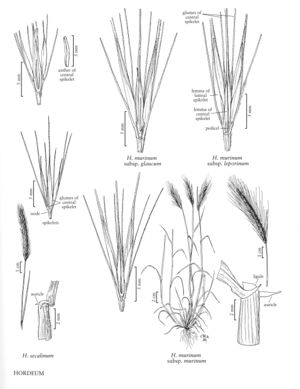Difference between revisions of "Hordeum murinum subsp. leporinum"
FNA>Volume Importer |
FNA>Volume Importer |
||
| Line 7: | Line 7: | ||
|synonyms={{Treatment/ID/Synonym | |synonyms={{Treatment/ID/Synonym | ||
|name=Hordeum leporinum | |name=Hordeum leporinum | ||
| − | |authority= | + | |authority= |
| + | |rank=species | ||
}} {{Treatment/ID/Synonym | }} {{Treatment/ID/Synonym | ||
|name=Critesion murinum subsp. leporinum | |name=Critesion murinum subsp. leporinum | ||
| − | |authority= | + | |authority= |
| + | |rank=subspecies | ||
}} | }} | ||
|hierarchy=Poaceae;Poaceae subfam. Pooideae;Poaceae tribe Triticeae;Hordeum;Hordeum murinum;Hordeum murinum subsp. leporinum | |hierarchy=Poaceae;Poaceae subfam. Pooideae;Poaceae tribe Triticeae;Hordeum;Hordeum murinum;Hordeum murinum subsp. leporinum | ||
| Line 22: | Line 24: | ||
-->{{Treatment/Body | -->{{Treatment/Body | ||
| − | |discussion=<p>Hordeum murinum subsp. leporinum grows in waste places, roadsides, and disturbed areas in arid regions. It is native to the Mediterranean region. It is now established in the Flora region, being most common in the western United States. A hexaploid cytotype has been found in Turkey, Armenia, Turkmenistan, and Iran. It has been named H. leporinum var. simulans Bowden. It is treated here as part of H. murinum subsp. leporinum.</p> | + | |discussion=<p><i>Hordeum murinum </i>subsp.<i> leporinum</i> grows in waste places, roadsides, and disturbed areas in arid regions. It is native to the Mediterranean region. It is now established in the Flora region, being most common in the western United States. A hexaploid cytotype has been found in Turkey, Armenia, Turkmenistan, and Iran. It has been named H. leporinum <i></i>var.<i> simulans</i> Bowden. It is treated here as part of <i>H. murinum </i>subsp.<i> leporinum</i>.</p> |
|tables= | |tables= | ||
|references= | |references= | ||
| Line 31: | Line 33: | ||
-->{{#Taxon: | -->{{#Taxon: | ||
name=Hordeum murinum subsp. leporinum | name=Hordeum murinum subsp. leporinum | ||
| − | |||
|authority=(Link) Arcang. | |authority=(Link) Arcang. | ||
|rank=subspecies | |rank=subspecies | ||
| Line 38: | Line 39: | ||
|basionyms= | |basionyms= | ||
|family=Poaceae | |family=Poaceae | ||
| − | |illustrator=Cindy Roché | + | |illustrator=Cindy Roché;Annaliese Miller |
| + | |illustration copyright=Utah State University | ||
|reference=None | |reference=None | ||
|publication title= | |publication title= | ||
|publication year= | |publication year= | ||
|special status= | |special status= | ||
| − | |source xml=https:// | + | |source xml=https://jpend@bitbucket.org/aafc-mbb/fna-data-curation.git/src/f50eec43f223ca0e34566be0b046453a0960e173/coarse_grained_fna_xml/V24/V24_358.xml |
|subfamily=Poaceae subfam. Pooideae | |subfamily=Poaceae subfam. Pooideae | ||
|tribe=Poaceae tribe Triticeae | |tribe=Poaceae tribe Triticeae | ||
Revision as of 20:20, 16 December 2019
Plants winter annuals. Culms 30-110 cm. Leaves green. Spikes green at anthesis, often more or less purple just before maturity. Central floret pedicellate; lemmas and awns shorter than those of the lateral florets; anthers 0.9-3 mm. Lateral spikelets: paleas scabrous on the lower 1/2; anthers 1.2-3.2 mm; rachillas about 0.25 mm, pale. 2n = 14, 28, 42.
Discussion
Hordeum murinum subsp. leporinum grows in waste places, roadsides, and disturbed areas in arid regions. It is native to the Mediterranean region. It is now established in the Flora region, being most common in the western United States. A hexaploid cytotype has been found in Turkey, Armenia, Turkmenistan, and Iran. It has been named H. leporinum var. simulans Bowden. It is treated here as part of H. murinum subsp. leporinum.
Selected References
None.
